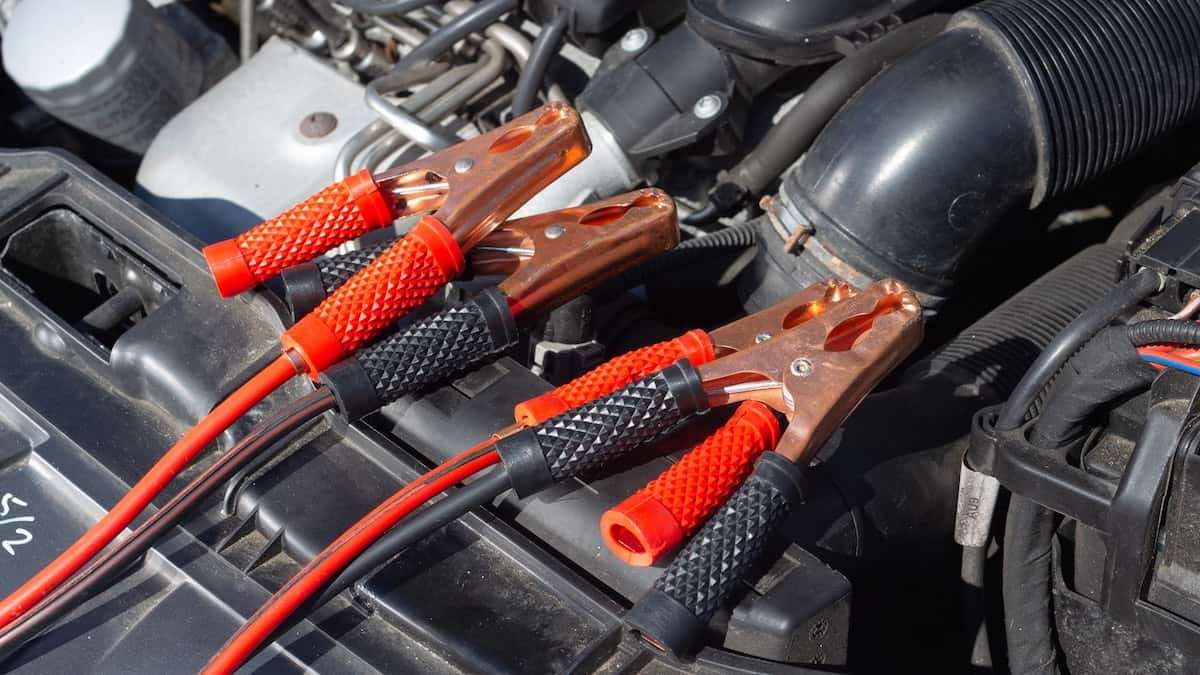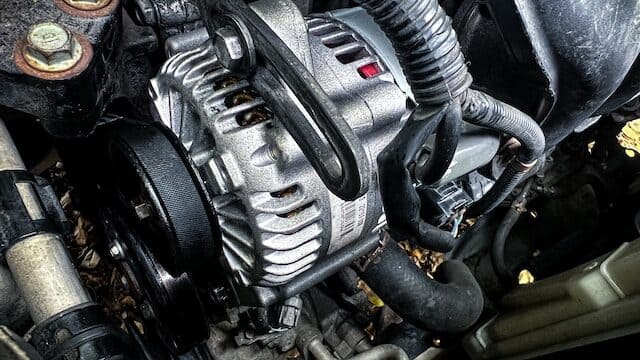A car alternator is a device that generates electrical power to recharge the battery and power the electrical systems of a vehicle. It is an essential component that converts mechanical energy from the engine into electrical energy for the car’s operation.
Apart from recharging the battery, the alternator also supplies power to the lights, ignition system, and other electronic devices in the vehicle. Without a functioning alternator, the battery will eventually lose power, resulting in a vehicle that won’t start or fails to operate its electrical systems.
Therefore, a car alternator is vital for the proper functioning of an automobile’s electrical system and overall performance.

Credit: www.torquenews.com
How Car Alternators Work
Car alternators are essential components of a vehicle’s electrical system, responsible for generating electrical power while the engine is running. Understanding the internal components of a car alternator offers insight into its functionality and how it efficiently produces electricity. The key internal components of a car alternator include the rotor, stator, voltage regulator, rectifier, and diodes.
Generating Electrical Power
The primary task of a car alternator is to generate electrical power to charge the battery and supply electricity to the car’s electrical components. This process begins with the rotor, which is a component that spins within the alternator housing. As the engine runs, it turns a belt that rotates the rotor. The rotor has a magnetic field created by a coil of wire wrapped around an iron core.
| Component | Function |
|---|---|
| Rotor | Produces a rotating magnetic field |
| Stator | Collects the rotating magnetic field and converts it into electrical energy |
| Voltage Regulator | Regulates the output voltage to prevent overcharging or undercharging of the battery |
| Rectifier | Converts the alternating current (AC) produced by the alternator into direct current (DC) |
| Diodes | Allow current to flow in one direction, preventing AC from flowing into the electrical system |
The rotating magnetic field from the rotor induces an alternating current (AC) in the stator windings, which are stationary coils surrounding the rotor. This AC is then converted into direct current (DC) through the rectifier, which consists of diodes that allow current to flow in one direction while blocking the flow in the opposite direction. The voltage regulator ensures a constant and appropriate level of voltage output to prevent overcharging or undercharging of the battery.
All these components work together in harmony to generate the necessary electrical power for a car’s operation. The alternator supplies power to the car’s electrical components and charges the battery, ensuring the vehicle is ready to start the next time the engine is turned on.
Signs Of A Failing Alternator
If you own a car, it’s important to be able to recognize the signs of a failing alternator. Your car’s alternator plays a crucial role in powering the electrical components and recharging the battery while the engine is running. When an alternator starts to fail, it can lead to a range of issues that may negatively affect your vehicle’s performance. In this article, we will explore some common signs that indicate your alternator may be failing, so you can address the problem and prevent any further damage.
Dimming Headlights
One telltale sign of a failing alternator is dimming headlights. If you notice that your headlights or other interior lights are flickering or becoming increasingly dim while you’re driving, it could be an indication that your alternator is not generating enough power. The alternator supplies electricity to the lights, and when it begins to malfunction, the lights may not receive the necessary voltage, resulting in dimming or flickering. Failing to address this issue promptly may lead to complete light failure, compromising your visibility on the road and potentially causing accidents.
Strange Noises
Another sign of a failing alternator is strange noises coming from under the hood of your car. If you hear a grinding or whining noise, it could be a warning sign that the alternator is wearing out. This noise is typically caused by a worn-out bearing or a faulty rotor, both of which are critical components of the alternator. Ignoring these noises may lead to a complete breakdown of the alternator, rendering it unable to generate electricity. It’s crucial to address any unusual sounds promptly to avoid being stranded with a dead battery or other electrical failures.
Replacing And Maintaining Your Alternator
The alternator is a crucial component of your car’s electrical system. Replacing and maintaining your alternator is essential for the smooth functioning of your vehicle. Here’s what you need to know.
Diagnosing The Issue
When your car shows symptoms of a failing alternator, it’s essential to diagnose the issue promptly. Common signs of a failing alternator include dimming headlights, strange noises, or a dashboard warning light. Use a multimeter to test the voltage output and ensure the alternator is the cause of the problem.
Diy Vs. Professional Repair
Deciding whether to tackle alternator replacement yourself or seek professional help is a critical consideration. DIY repair can be cost-effective, but it requires mechanical knowledge and the right tools. On the other hand, professional repair ensures expertise and warranty for the replacement. Assess your skills and the complexity of the task before making a decision.
Choosing The Right Alternator For Your Vehicle
When it comes to ensuring your vehicle’s electrical system runs smoothly, choosing the right alternator is crucial. A car alternator plays a key role in charging the battery and powering electronic components while the engine is running.
Understanding Amperage Ratings
Amperage ratings determine the amount of electrical power the alternator can supply to your vehicle’s systems. Higher ratings are suitable for vehicles with added electrical components like aftermarket stereos or lighting systems.
Compatibility With Your Vehicle
When choosing an alternator, ensure it is compatible with your vehicle’s make and model to avoid installation issues. Check the mounting points, voltage requirements, and connector types to guarantee a perfect fit.
Enhancing Alternator Performance
An alternator is a crucial component in a vehicle’s electrical system. Optimizing its performance can significantly improve the overall efficiency and reliability of your car.
Upgrading To A High-output Alternator
Consider installing a high-output alternator to meet the increased electrical demands of modern vehicles, especially those with aftermarket accessories. This upgrade enhances the charging capacity and ensures a consistent power supply.
Implementing Correct Belt Tension
Maintaining proper belt tension is essential for the alternator to function efficiently. Loose belts can slip, leading to a decrease in power generation. Regular inspection and adjustments can prevent potential issues.

Credit: m.facebook.com

Credit: m.facebook.com
Frequently Asked Questions For What Is Car Alternator
What Are The Symptoms Of A Bad Alternator?
The symptoms of a bad alternator include dimming headlights, dead battery, strange noises, and dashboard warning lights. If you experience any of these signs, it’s essential to have your alternator checked by a professional mechanic. Addressing the issue promptly can prevent car breakdowns.
What Does The Car Alternator Do?
The car alternator is responsible for producing electrical power in your vehicle. It converts the mechanical energy from the engine into electrical energy to charge the battery and power the electrical components while the car is running.
What Happens When Your Car Alternator Dies?
When your car alternator dies, the battery won’t recharge and your vehicle will eventually lose electrical power. This means your car’s lights, radio, and other electrical components won’t work.
How Long Do Alternators Last In A Car?
Most alternators last between 7-10 years, or 100,000-150,000 miles with regular maintenance. Factors like driving conditions and electrical load can affect longevity. Regular inspections can help catch issues early.
Conclusion
Understanding the importance of your car’s alternator is essential for maintaining its performance. With its role in charging the battery and powering electrical systems, a properly functioning alternator is crucial. By recognizing the signs of alternator issues and addressing them promptly, you can ensure your vehicle runs smoothly and avoid potential breakdowns.
Prioritizing alternator maintenance will contribute to the longevity of your car’s electrical components and overall reliability.
